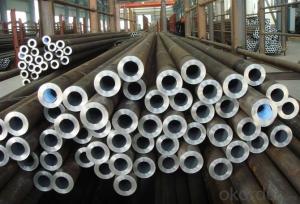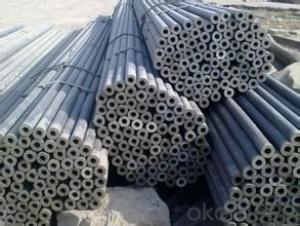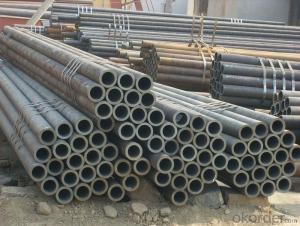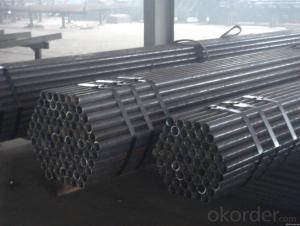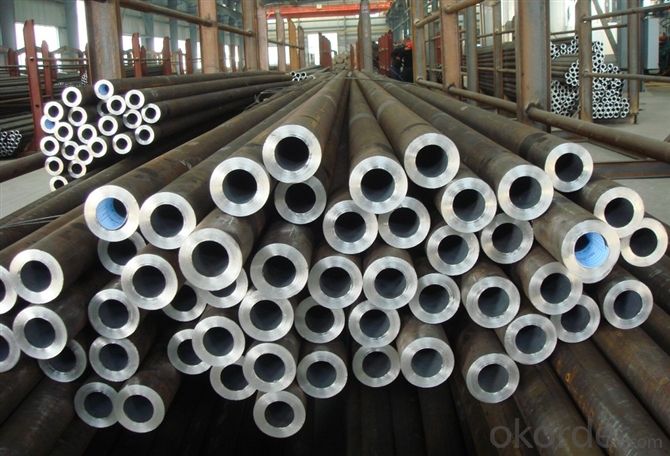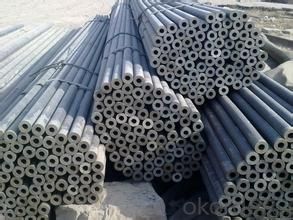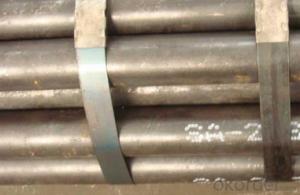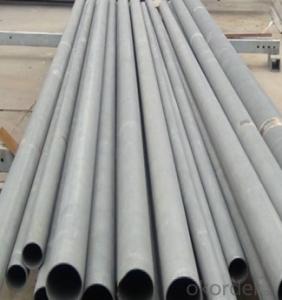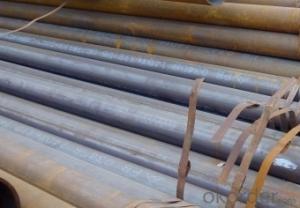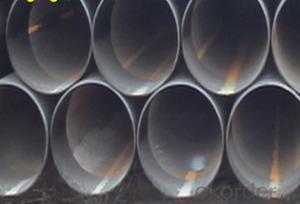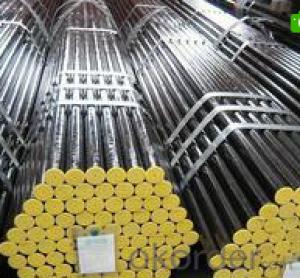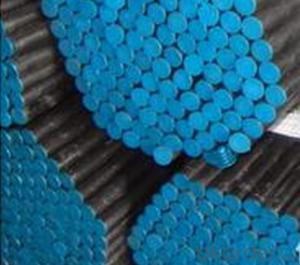Schedule 40 ASTM A53 API 5L GR.B Carbon Seamless Steel Tubes factory
- Loading Port:
- Tianjin
- Payment Terms:
- TT or LC
- Min Order Qty:
- 20 m.t.
- Supply Capability:
- 90000 m.t./month
OKorder Service Pledge
OKorder Financial Service
You Might Also Like
● Full series of products provides an easier access for one stop purchase
▲ Line pipe
▲ Tubing and casing
▲ L & M & H boiler tube
▲ Gas cylinder tube & pipe
▲ Mechanical & Structural pipe
▲ Ship-building tube & pipe
▲ Automobile tube & pipe
1、Structure of Seamless Pipe JIS G3461/ G3462:
Seamless steel pipes, a large number of used pipes conveying fluids, such as transport oil, natural gas, gas, water pipes and some solid materials, and so on. Compared to other steel and solid steel bar, the same torsional strength in bending, lighter, is an economic cross-section steel, widely used in the manufacture of structural parts and mechanical parts, such as drill pipe, automotive drive shafts, bicycle rack and construction using steel scaffolding ring with steel pipe manufacturing parts, can improve material utilization, simplify the manufacturing process, saving material and machining time, such as bearing rings, jack sets, has been widely used to manufacture steel. Steel or a variety of conventional weapons indispensable material, gun barrels to make steel. Steel shapes in different cross-sectional area can be divided into tube and shaped tubes. As in the perimeter of equal conditions, the largest area of a circle with a circular tube can carry more fluid. In addition, the circular cross section to withstand internal or external radial pressure, the force is uniform, so the vast majority of the pipe is pipe.
Standard: JIS G3461/ G3462: Carbon steel tubes for boiler and heat exchanger/
alloy steel tubes for boiler and heat exchanger tubes
● Application: JIS G3461 is for Carbon steel tubes for boiler and heat exchanger
JIS G3462 is for alloy steel tubes for boiler and heat exchanger tubes
● Steel Grade: STB 340,410,510; STBA12, 13, 20,22,23,24
2、Main Features of the Seamless Pipe JIS G3461/ G3462:
• High manufacturing accuracy
• High strength
• Small inertia resistance
• Strong heat dissipation ability
• Good visual effect
• Reasonable price
3、Seamless Pipe ASTM A106/53 Specification:
Standard | GB, DIN, ASTM ASTM A106-2006, ASTM A53-2007 |
Grade | 10#-45#, 16Mn 10#, 20#, 45#, 16Mn |
Thickness | 8 - 33 mm |
Section Shape | Round |
Outer Diameter | 133 - 219 mm |
Place of Origin | Shandong, China (Mainland) |
Secondary Or Not | Non-secondary |
Application | Hydraulic Pipe |
Technique | Cold Drawn |
Certification | API |
Surface Treatment | factory state or painted black |
Special Pipe | API Pipe |
Alloy Or Not | Non-alloy |
Length | 5-12M |
Outer Diameter | 21.3-610mm |
Grade | 20#, 45#, Q345, API J55, API K55, API L80, API N80, API P110, A53B |
Standard | ASME, ASTM |
1) Material:20#(ASTM A 106/A53 GRB.API5LGRB,GB),45#,16Mn,10#.
2) Specification range:OD:21.3-610mm,WT:6-70mm,length:6-12m or according to the requirement of clients.
3) Excutive standards:GB,ASME API5L.ASTM A 106/A53,Despite of the above standards,we can also supply seamless steel pipe with standard of DIN,JIS,and so on,and also develop new products according to the requirements of our clients!
4) Surface:black lacquered,varnish coating or galvanized.
5) Ends:Beveled or square cut,plastic capped,painted.
6) Packing:bundles wrapped with strong steel strip,seaworthy packing.
4、Packaging & Delivery
Packaging Details: | seaworthy package,bundles wrapped with strong steel strip |
Delivery Detail: | 15-30days after received 30%TT |
5、FAQ of Seamless Pipe JIS G3461/ G3462:
①How is the quality of your products?
Our products are manufactured strictly according to national and internaional standard, and we take a test
on every pipe before delivered out. If you want see our quality certifications and all kinds of testing report, please just ask us for it.
Guaranteed: If products’ quality don’t accord to discription as we give or the promise before you place order, we promise 100% refund.
②How about price?
Yes, we are factory and be able to give you lowest price below market one, and we have a policy that “ for saving time and absolutely honest business attitude, we quote as lowest as possible for any customer, and discount can be given according to quantity”,if you like bargain and factory price is not low enough as you think, just don’t waste your time.Please trust the quotation we would give you, it is professional one.
③Why should you chose us?
Chose happens because of quality, then price, We can give you both.Additionally, we can also offer professional products inquiry, products knowledge train(for agents), smooth goods delivery, exellent customer solution proposals.Our service formula: good quality+good price+good service=customer’s trust
SGS test is available, customer inspection before shipping is welcome, third party inspection is no problem.
6、Seamless Pipe JIS G3461/ G3462 Images
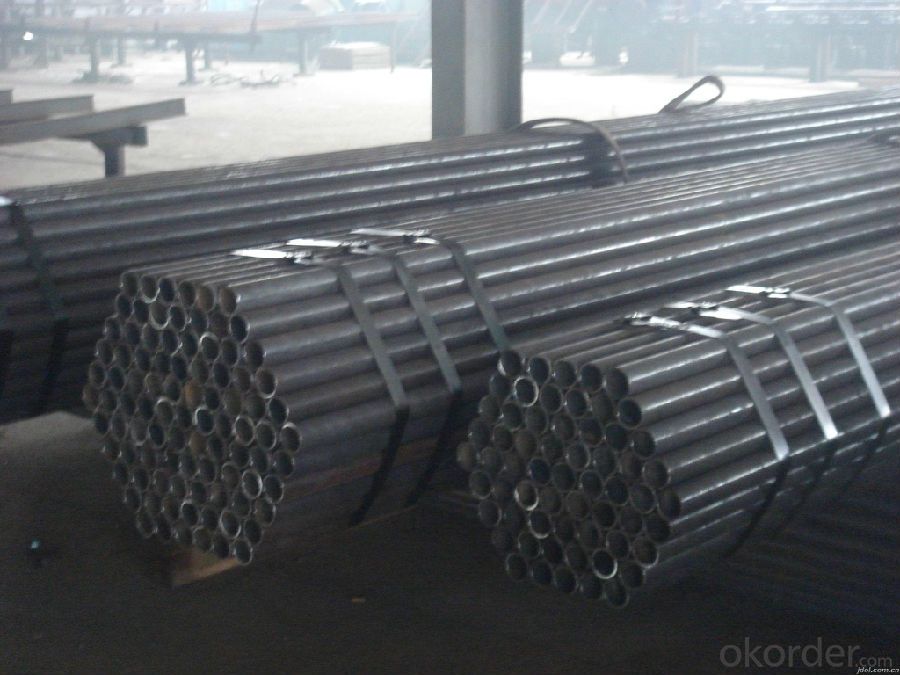
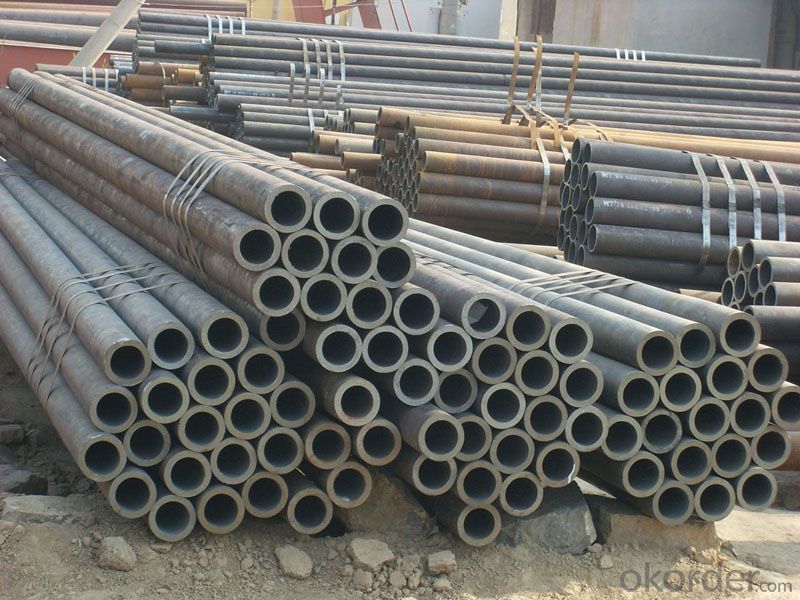
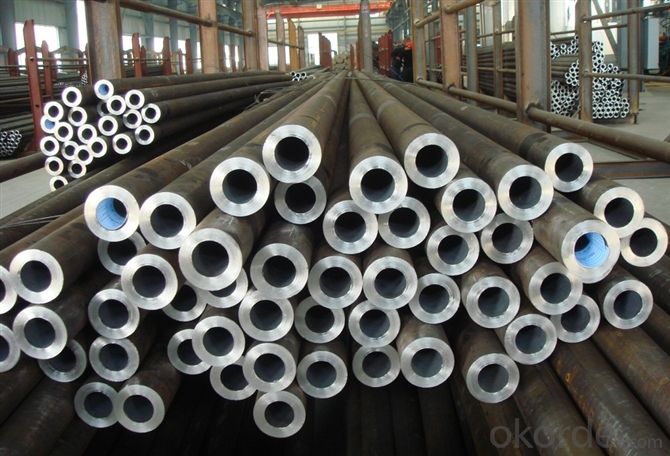
- Q: Are steel pipes suitable for wastewater treatment facilities?
- Yes, steel pipes are suitable for wastewater treatment facilities. Steel pipes are commonly used in these facilities due to their high strength, durability, and resistance to corrosion. Wastewater treatment facilities typically handle corrosive and abrasive materials, and steel pipes are able to withstand these harsh conditions. Additionally, steel pipes are available in various sizes and configurations, allowing for easy installation and customization to meet the specific needs of the facility. Furthermore, steel pipes can be easily repaired or replaced if necessary, ensuring the longevity and reliability of the wastewater treatment system. Overall, steel pipes are a suitable choice for wastewater treatment facilities due to their strength, durability, corrosion resistance, and flexibility in installation and maintenance.
- Q: How are steel pipes used in the construction of pipelines?
- Steel pipes are commonly used in the construction of pipelines due to their durability, strength, and resistance to corrosion. These pipes are welded together to form a continuous line, allowing fluids or gases to be transported over long distances. The steel pipes are essential for ensuring a reliable and efficient flow of materials, such as oil, gas, or water, in various industries, including oil and gas, water supply, and infrastructure development.
- Q: How are steel pipes used in the construction of chemical plants?
- Steel pipes are commonly used in the construction of chemical plants for various purposes. They are primarily utilized for transporting fluids and gases, such as chemicals, water, and steam, throughout the facility. These pipes are selected for their durability, strength, and resistance to corrosion, which is crucial in an environment where exposure to harsh chemicals is common. Steel pipes are also used for structural support, such as in the construction of platforms, walkways, and pipe racks. Additionally, they can be employed for ventilation and exhaust systems, as well as for fire protection systems in chemical plants. Overall, steel pipes play a vital role in ensuring the safe and efficient operation of chemical plants.
- Q: Can steel pipes be used for water distribution networks?
- Yes, steel pipes can be used for water distribution networks. Steel is a durable and strong material that can withstand high water pressure and provide a long-lasting solution for transporting water in distribution networks. However, it is important to properly coat the steel pipes with suitable materials to prevent corrosion and ensure the safety and quality of the water being distributed.
- Q: What are the different types of gaskets used with steel pipes?
- There are several types of gaskets commonly used with steel pipes, including spiral wound, ring joint, and flat gaskets. Spiral wound gaskets are made by winding a metal strip and a filler material together, providing excellent sealing properties. Ring joint gaskets are typically used in high-pressure applications and have a metallic ring shape to ensure a tight seal. Flat gaskets, on the other hand, are simple, flat pieces of material, often made from rubber or graphite, and are used for low-pressure applications.
- Q: Are steel pipes suitable for use in acidic environments?
- Steel pipes may not be suitable for use in acidic environments because they can corrode and degrade when exposed to acids, leading to potential leaks and structural issues.
- Q: How are steel pipes used in the construction of tunnels?
- Steel pipes are commonly used in the construction of tunnels to provide structural support, facilitate drainage systems, and carry various utilities such as water, gas, or electrical cables. These pipes are often installed as part of the tunnel's foundation or as a protective casing for the tunnel's infrastructure.
- Q: Are steel pipes environmentally friendly?
- There are several reasons why steel pipes can be considered environmentally friendly. To begin with, steel is an incredibly durable and long-lasting material, giving steel pipes a longer lifespan in comparison to plastic pipes and other materials. This reduces the need for frequent replacements and repairs, resulting in less waste and conservation of resources. Another point to consider is that steel is highly recyclable. When steel pipes reach the end of their lifespan, they can be easily and efficiently recycled without losing their properties or quality. This reduces the demand for new steel production, which often requires substantial amounts of energy and resources. Moreover, steel pipes possess a high resistance to corrosion, meaning that they necessitate fewer chemical treatments to prevent rusting and maintain their structural integrity. Consequently, this diminishes the release of harmful chemicals into the environment and minimizes the impact on ecosystems and human health. Additionally, it is important to highlight that steel pipes find application in various industries, including water supply and wastewater management. Renowned for their exceptional strength and reliability, steel pipes ensure the safe and efficient transportation of fluids. This lowers the risk of leaks and spills, averting water source contamination and safeguarding the environment. Nevertheless, it is crucial to acknowledge that the production of steel pipes does have some environmental consequences. The extraction of raw materials, such as iron ore and coal, demands energy and can contribute to deforestation, habitat destruction, and greenhouse gas emissions. Additionally, the manufacturing process itself generates emissions and waste. Overall, although steel pipes are not entirely devoid of environmental impact, their durability, recyclability, and resistance to corrosion make them a comparatively environmentally friendly choice when compared to alternative materials.
- Q: What are the common challenges faced during steel pipe installation?
- When installing steel pipes, there are various challenges that may arise. One of these challenges involves the need to ensure that the pipe sections are properly aligned and fit together correctly. Welding or threading is typically used to join steel pipes, and if the alignment is not precise, it can result in leaks or weak points in the pipeline. To overcome this challenge, it is necessary to use careful measurements and alignment techniques to ensure a secure and tight fit between the pipe sections. Another challenge that arises is dealing with corrosion and rust. Steel pipes are prone to corrosion, especially when exposed to moisture or corrosive substances. This can lead to the deterioration of the pipes over time, compromising their structural integrity and increasing the risk of leaks. To address this challenge, it is possible to apply protective coatings or linings to the steel pipes to prevent corrosion and extend their lifespan. Additionally, the weight and size of steel pipes can pose a challenge during installation. Steel pipes are heavy, and it can be physically demanding to maneuver and position them. Moreover, the large diameter of some steel pipes makes it difficult to transport and handle them in tight spaces or through narrow pathways. Overcoming this challenge often requires the use of heavy machinery, such as cranes or forklifts, to lift and position the pipes correctly. Lastly, environmental factors can also present challenges during steel pipe installation. Extreme temperatures, harsh weather conditions, or unstable soil conditions can impact the installation process. For example, freezing temperatures can make it challenging to weld the pipes, while unstable soil may require additional reinforcement or stabilization measures to ensure the longevity of the pipeline. In conclusion, the challenges commonly faced during steel pipe installation include the need for proper alignment, the issue of corrosion and rust, the handling of the weight and size of the pipes, and the consideration of environmental factors. Overcoming these challenges requires careful planning, attention to detail, and the utilization of appropriate techniques and equipment.
- Q: Are steel pipes resistant to chemicals?
- Yes, steel pipes are generally resistant to chemicals. They have excellent corrosion resistance properties, making them suitable for transporting various chemicals in industries such as oil and gas, chemical processing, and wastewater treatment. However, the level of resistance can vary depending on the specific type of chemical and the grade of steel used. In some cases, additional protective coatings may be required to enhance chemical resistance.
Send your message to us
Schedule 40 ASTM A53 API 5L GR.B Carbon Seamless Steel Tubes factory
- Loading Port:
- Tianjin
- Payment Terms:
- TT or LC
- Min Order Qty:
- 20 m.t.
- Supply Capability:
- 90000 m.t./month
OKorder Service Pledge
OKorder Financial Service
Similar products
Hot products
Hot Searches
Related keywords
